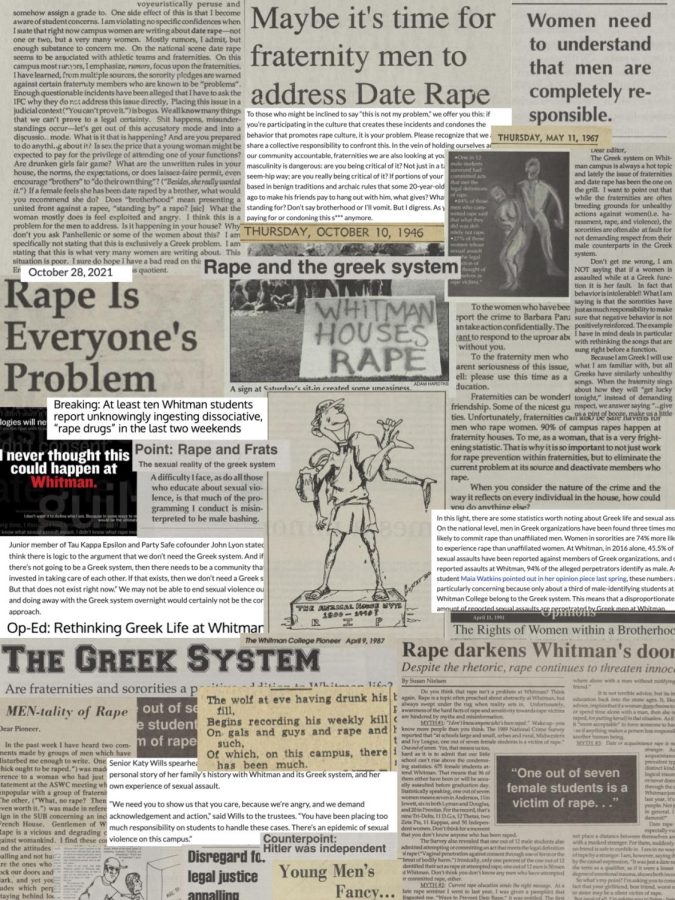Dear Editor,
In regards to Zach Duffy’s article on implementing a mandatory volunteer policy, I present to you the following picture . . . Shovels dig into the freshly ground dirt outside a Habitat for Humanity house as a troop of Whitman volunteers smile in the early morning sunrise. Gary, the volunteer manager, laughs along with the students as he shows them how to hammer up drywall and work a band saw. I don’t know about most Whitman students, but this is one of the pictures that comes to my mind when I think about the volunteering community at Whitman. As Zach Duffy so aptly pointed out, in his article published in last week’s issue, the Center for Community Service coordinates many well-run programs and even leads service trips before school and during breaks. The students that volunteer are ambitious, busy and sometimes tired, but they always make time for helping out their community. Why then should we force the entire Whitman campus participate in an activity that they always had access to but failed to appreciate? Why should non-committed volunteers be forced to participate in programs in which they don’t have time for and don’t want to do? Why should the communities of Walla Walla be saturated by Whitman students only seeking to fulfill yet another prerequisite for graduation? The idea of Whitman implementing mandatory volunteer hours is one I find degrading to all current volunteers and frankly, as a matter of principle, it disgusts me.
A volunteer, as defined by the Merriam-Webster Dictionary, is “a person who provides a service willingly and without pay.” If Whitman forced students to volunteer, not only would they be going unwilling but the price of their “free service” would then be considered their diploma, their thesis or their bachelor’s degree. Volunteering then ceases to be “volunteering” in the strict sense of the word and becomes something else entirely, “mandatory work hours” perhaps. Mr. Duffy criticized Whitman for viewing volunteering as a “purely selfless act,” but isn’t that what it should be? Volunteering at Whitman is a way for students to get out in the community and see what the world outside of campus is really like. It is a way for them to meet new people and expand on their ideas outside of the classroom and their dorm rooms, but it is also something they should chose to do for themselves. Without that choice it becomes yet another freshman complaint. Like Core (now known as Encounters), a volunteering requirement would only promote freshman bonding under the guise of group grumbling about getting up early to work on a house or rake a lawn. Contrary to last week’s article, mandatory volunteer hours will not magically change the intrinsic nature of all Whitties, forcing us to become model citizens.
Furthermore, what would Whitman’s implementation of a volunteering incentive really say about the college’s philosophy? That in order to do something nice and be a good citizen there has to be a reward involved? That we are not trying to give people the tools in which to make their own decisions but rather forcing them to do what “The Man” knows will be best for them? I thought the whole point of a liberal arts education is to allow people to formulate their own ideas? The fact is real life, outside Ankeny and Jewett, won’t give you an incentive to volunteer. Your incentive to volunteer is yourself and your own need to connect with people different than you. A Whitman volunteer incentive will only result in future moral laxity of the campus population. If someone in your life is always telling you what to do and why you should do it, you will eventually fail to see the point in it yourself. Volunteering is special and good for self morale precisely because people are freely choosing to do it. Without that aspect the point behind volunteering is gone, and therefore so is the notion that an incentive for service will ever produce the benefits that Mr. Duffy refers to. If Whitman wants to prepare its students for life and leadership the last thing it should be doing is spoon feeding them morality in the form of yet another graduation requirement. In real life no one requires you to go out and get involved. You have to figure it out by yourself. Why should Whitman be any different?
Yours Sincerely,
Rachel Sicheneder


